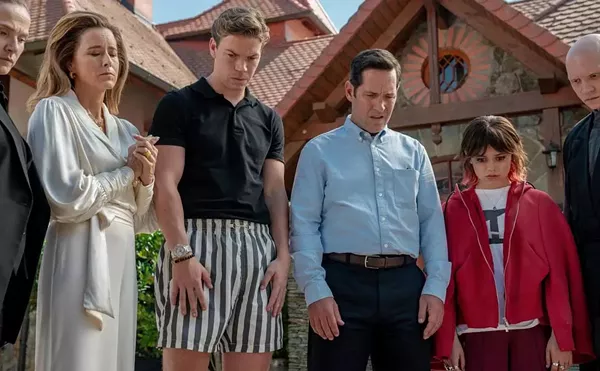The Cuckoo takes place toward the end of World War II and opens with a Finnish soldier named Veiko (Ville Haapasalo) being chained to a stake driven deep into a huge rock, for reasons that are never made clear. Apparently he’s done something to offend his brothers in arms. Possibly he’s indulged in too much pacifist grousing, but just as likely it’s because he’s the type of person who almost never shuts up. Whatever the case, he’s not only left behind in fetters, but he’s been dressed in a German uniform to draw the fire of advancing Russian troops who have been given orders to shoot German soldiers on sight. Not to be unsporting, his tormentors have left him with a rifle and some ammo. Veiko is an excellent shot, a trained sniper and he’s instructed to take out as many Russians as possible (the Finns at this point being allied with the Germans) before he’s killed or dies of starvation. Against his will he’s become what the Russians call “a cuckoo,” a sniper on a suicide mission.
But Veiko has no intention of playing such a role and, as soon as his compatriots disappear into a nearby forest, he begins the laborious process of freeing himself. Using his glasses to start a fire and aided by some available foliage and powder from his rifle shells, he gradually loosens the rock around the stake, a process which takes a couple of days and the first 20 minutes or so of the film.
Meanwhile, we’re introduced to the second of what will be our three protagonists, Ivan (Viktor Bychkov), who’s been arrested for unspecified dissident activity and who, while being driven to a place where he can stand trial, survives a Russian plane attack which kills the two men guarding him. The attack is witnessed by Veiko, close enough to see through the scope of his rifle but still chained to his rock.
Ivan, unconscious, is discovered by a local peasant woman, a Laplander reindeer farmer named Anni (Anni-Kristiina Juuso). She takes him home to her hovel to nurse him back to health and soon the finally freed Veiko shows up. Veiko is willing to be friendly toward Ivan — he’s had enough of the war and just wants to go home — but Ivan can’t see past the German uniform Veiko is still wearing and decides that he’s going to kill him the first chance he gets.
The story then settles into being an unsubtle but interesting anti-war allegory, with its two reluctant soldiers and its peasant woman whose sagacity is a given by dint of her being female and largely untouched by civilization. This long, leisurely section also contains the film’s most ingenious conceit: None of the three can speak the other’s language and, though they converse constantly, nobody can understand what the other is saying. Sometimes the meaning can be intuited, but just as often it leads to frustrating and/or comic misunderstanding, as when Ivan, who’s a poet, shows Anni a picture of his literary mentor, a fine-featured man with the traditional long hair of the artistic class. She mistakes it for a picture of his wife, remarking that she looks “very beautiful.”
Written and directed by Alexander Rogozhkin, The Cuckoo is hobbled by an absurd “mystical” ending, which is not only an abrupt tonal shift from the film’s contrived but formally realistic style, but which also has the earmarks of a deus ex machina devised by a writer who couldn’t quite figure out how to end his story. Without giving anything away, suffice it to say that Anni has powers beyond those of mere mortals and death turns out to be a little blond-haired boy in a white smock.
Those who aren’t bothered by this kind of idealization of the primitive will doubtlessly enjoy the film more than I did. And Juuso, a real-life Lapp (or Sami, as she prefers to be called), is a beguiling presence, even as she’s asked to embody Rogozhkin’s corny magical earth mother three-fourths of a pretty good film, a dark comedy rigorously observed, until he reveals himself to be just another New Age softie.
Showing exclusively at the Detroit Film Theatre (inside the DIA, 5200 Woodward Ave., Detroit), Friday through Sunday. Call 313-833-3237.
Because of last weekend’s blackout, special make-up screenings of Stevie will be offered at the DFT on Thursday, Aug. 21 (7:30 p.m.) and Sunday, Aug. 24 (noon).
Richard C. Walls writes about film for Metro Times. E-mail letters@metrotimes.com.





